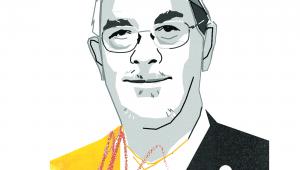It’s extraordinary — apparently there is a whole world out there that feels it doesn’t know enough about the Conservative Party policy on fish.
Or is it GM food, or capital gains tax, or the European directive on the market in financial instruments?
It seems that the phenomenon is sweeping Britain. Taxi drivers are turning to their fares and saying: ‘I had that David Cameron in the back of the cab — he had nothing to say about personal allowances.’
In the BBC projects department, plans are already in hand for a new series of Strictly Come Formulating, hosted by Bruce Forsyth, in which celebrities team up with policy directors from Right-wing think-tanks to devise manifesto pledges. Week one: the global warming quick-step; week two: the tax pledge shuffle.
Down in Bournemouth, those razor-sharp Tories got the message. Having seen all their other master plans for electoral victory dashed, the same people that brought the voters the Free Pinochet campaign, patients’ passport and ten days to save the pound, are playing their final trump card — tax cuts.
Enough of the husky dogs and oak tree logos, they cry. What the public wants is policy and plenty of it. In particular, they want pledges of tax cuts.
Now this is a doubly seductive appeal. In the first place, Conservatives believe in tax cuts. They believe in the smaller state and they have enjoyed much electoral success offering (though it should be stressed not always delivering) the lure of lower taxes.
Second, the push comes at a time when Cameron is experiencing his first pangs of vulnerability. After a breathtaking start in which he has done almost everything right, he is beginning to face questions about what he actually stands for other than winning.
Of course, after ten years, simply standing for winning is something of a political advance. But, not unreasonably, people are asking whether there is any substance.
And Cameron is weak on this, not merely because he has offered so little substance but because the policies he has unveiled have often been shown to be flawed and superficial.
More importantly, the die-hards are at least half right. The Conservatives should be about lowering tax burdens and reducing the size of the state.
What is more, Cameron is in danger of ceding too much of this political ground to Labour, which has made the case for higher public spending.
But the truth is this is not really about taxes. It is not really about policy. Even Right-wingers know that while the voters would support lower taxes they don’t believe political pledges to deliver them.
Nor, in truth, do even the most detail-obsessed nerds think voters have any real appetite for detailed policies.
What voters look for is a sense of what the party is about. They want a feel for a leader’s attitudes and instincts; who are they for; what are they against. This is something Cameron is doing very well. He has not finished.
He has successfully defined what he is not and in so doing has won back the voters’ attention. Now he must define what he is. This is more risky. But he does not need to do this with policy pledges; he needs to do it with a couple of talismanic policies and a clear sense of what kind of people his Tory party are.
The problem for Right-wingers — and the reason they want to pin him down to policy — is that they already have a pretty good idea of what kind of person he is and don’t like what they see. They saw what happened to Labour when it gifted itself to Tony Blair. Yes, yes, it won three terms but to the Old Labour purists it also sold its soul. Having surrendered to Blair it could not then fight back when he won on his terms.
The Old Conservatives have seen and taken note. They don’t like Cameron’s environmentalism, they fear his modernity and positively loathe his liberal instincts. The problem is not that they don’t know what he stands for: the problem is that they know it all too well.
Of course, it is hard to fight rhetoric, especially since any fight on that ground would be on his terms. Hence the desire to pin him down on policy.
That is why Cameron is so fiercely resisting and why he is right to do so. When the time comes, he’ll prove just as voracious a tax-cutter as his colleagues. He has — if his colleagues bothered to listen — in fact already promised to do so in his pledge to share the proceeds of growth with voters.
This fight is about the Right’s mistrust of Cameron — and, indeed, its mistrust of every leader since John Major. Unlike his predecessors, Cameron has decided that the cost of winning that trust is not a price worth paying.










